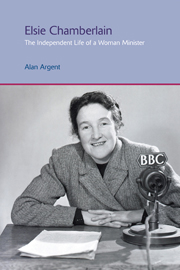Book contents
- Frontmatter
- Dedication
- Contents
- List of Illustrations
- Acknowledgements
- 1 Introduction and Early Life
- 2 The Call to the Ministry
- 3 Elsie Begins Her Ministry, 1939
- 4 The Return to London, 1941
- 5 Flying into the Storms: Chaplain in the Royal Air Force, 1945
- 6 A Season of Clear Shining: Married Life
- 7 Vineyard Congregational Church, Richmond-upon-Thames
- 8 Later Years at Vineyard
- 9 International Meetings and the CUEW Chair
- 10 Elsie at the BBC
- 11 After the BBC: The City Temple
- 12 The Sky Turns Black: Another Crisis
- 13 Sometimes a Light Surprises: The Congregational Federation
- 14 Hutton Free Church, 1971
- 15 A Local Thunderstorm: The Kentish Town Situation
- 16 Presidential Duties and Travelling, 1973–1980
- 17 Going West, 1980
- 18 Ministry in Nottingham, 1984–1991
- 19 Epilogue
- Bibliography
- Index
10 - Elsie at the BBC
- Frontmatter
- Dedication
- Contents
- List of Illustrations
- Acknowledgements
- 1 Introduction and Early Life
- 2 The Call to the Ministry
- 3 Elsie Begins Her Ministry, 1939
- 4 The Return to London, 1941
- 5 Flying into the Storms: Chaplain in the Royal Air Force, 1945
- 6 A Season of Clear Shining: Married Life
- 7 Vineyard Congregational Church, Richmond-upon-Thames
- 8 Later Years at Vineyard
- 9 International Meetings and the CUEW Chair
- 10 Elsie at the BBC
- 11 After the BBC: The City Temple
- 12 The Sky Turns Black: Another Crisis
- 13 Sometimes a Light Surprises: The Congregational Federation
- 14 Hutton Free Church, 1971
- 15 A Local Thunderstorm: The Kentish Town Situation
- 16 Presidential Duties and Travelling, 1973–1980
- 17 Going West, 1980
- 18 Ministry in Nottingham, 1984–1991
- 19 Epilogue
- Bibliography
- Index
Summary
Elsie had acquired some small experience of broadcasting before she was employed by the British Broadcasting Corporation. In August 1945, she had been invited to give six brief talks in the popular wireless programme Lift Up Your Hearts which had been on the air since 1939. These talks, of four to four and a half minutes each (650–700 words), went out in the week October 22–27 from 7.55 to 8 am. In preparation for the broadcast, Elsie had been advised to put her thoughts into simple words, avoiding traditional phrases of Christian piety (that is churchy language), but encapsulating ‘some truth of the Gospel’. She clearly acquitted herself well for she was later congratulated for these ‘really excellent broadcasts’ by Kenneth Grayston, the assistant head of religious broadcasting (1944–1949) and a Methodist minister. Three years later, in November 1948, Elsie took part in a discussion on ‘Women as Ordained Clergy’, to be transmitted to Sweden. Therefore this brief taste of broadcasting had given her some valuable knowledge of how things were done at the BBC and had whetted her appetite for more.
On the basis of these forays into radio, Elsie was encouraged by her mother in May 1950 to apply for the post of assistant producer in the Religious Broadcasting department of the BBC. Hundreds of hopeful applications were sent in to the BBC, from recently unseated former Labour MPs, and Christian ministers and laypersons of all denominations.
- Type
- Chapter
- Information
- Elsie ChamberlainThe Independent Life of a Woman Minister, pp. 108 - 120Publisher: Acumen PublishingPrint publication year: 2012



